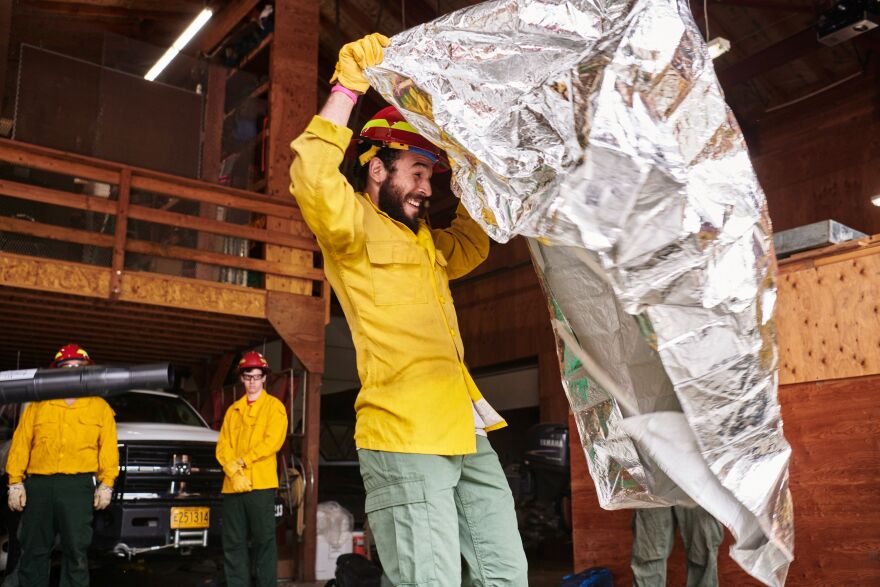As wildfire season gets underway, Native American tribes in Oregon are cautiously preparing under the shadow of the COVID-19 pandemic.
Note: Support for this coverage comes from Underscore.news, a reporting team focused on public service journalism based in Portland, Oregon.
At a firefighter boot camp in Grand Ronde, roughly 30 recruits prepare to dive into individual fire shelters. These flexible, body-length coverings serve as a last-resort tool when the user is overcome by fire. A trainer prepares to hit them with a few gusts from a leaf blower, to simulate harsh winds that may hamper survival efforts.

It’s not just out-of-control wildfires that can threaten firefighters this year. COVID-19 is also on their minds. Earlier this month, coordinators cut the five-day boot camp schedule to three. And firefighters who passed last year’s training were “grandfathered” in for this season.
Colby Drake is Fire Prevention Manager for the Confederated Tribes of the Grand Ronde. He shares other protocols in place this year.
“Temperature checks, checking in daily with our staff and employees seeing where they are, before we get even deployed to a fire assignment we have to make sure that’s all good.”
Firefighting is a reliable, lucrative line of seasonal work for many Native Americans. Drake hopes that firefighters safeguard themselves and their team should they suspect they have the coronavirus.

“One of the things that we’re really going to have to hammer home is integrity with people, and telling the truth whether they’re sick and not feeling well," says Drake.
"Because at the end of the day a lot of people are doing this job for making some good money and that’s the last thing they want to do, is impact that opportunity for people.”
Besides immediate health risks to native firefighters, there’s also threats to neighboring communities, including reservations. Tim Vredenburg is Director of Forest Management for the Cow Creek Tribe. He says the pandemic and fire season can harm people with underlying conditions.
“You know, when there’s a global pandemic that specifically affects the respiratory system - to have wildfire that could be contributing more particulate, more smoke into the atmosphere, aggravating respiratory health, I feel that initial attack and aggressive fire response is critical.”

And there’s the economic threat. For many tribes, timber is a primary source of revenue after casinos. Cody DeSautel is Natural Resources Director for the Colville Tribes, and a member of the Intertribal Timber Council. He fears that COVID-19 may tax wildfire operations, which in turn can reduce their effectiveness. He recalls such an issue on the Colville Reservation five years ago.
“We had two big fires that broke on the reservation, had very few suppression resources because they were allocated to other places that had more communities and people at risk," DeSautel tells KLCC.
"So we ultimately saw about 250,000 acres burn on our reservation that year, about 800 million board feet of timber. It was probably $100 million worth of timber that burned up that year.”
That destroyed acreage means less funding for tribal programs, including elder and youth services, adds DeSautel. He hopes the 2020 wildfire season is light, so there’s less strain on firefighters and the tribe’s well-being.
Copyright 2020, KLCC.





